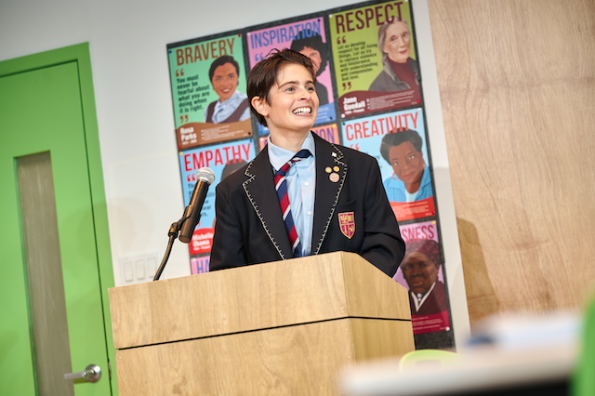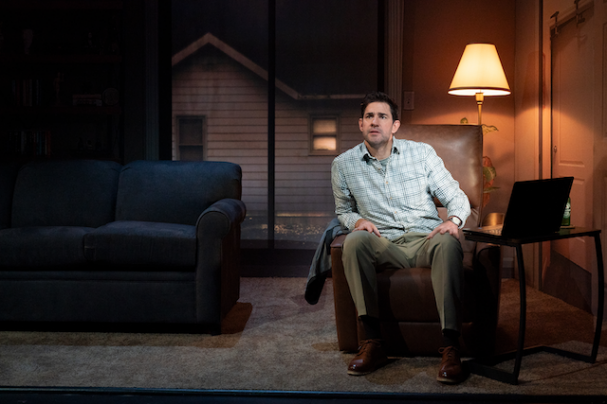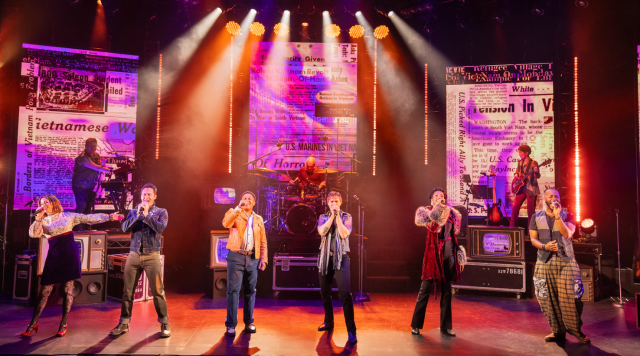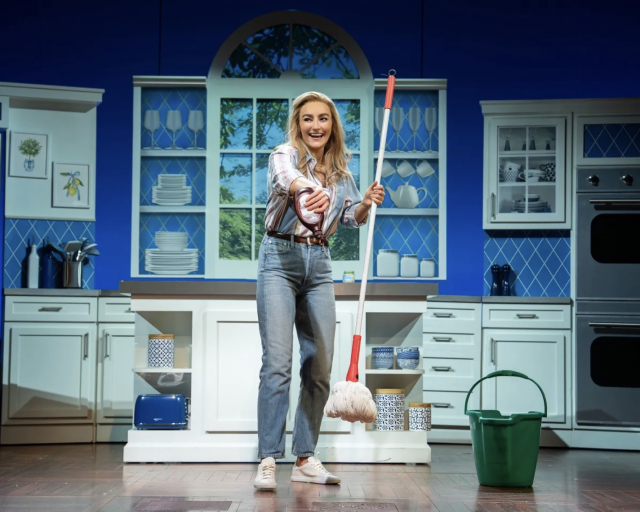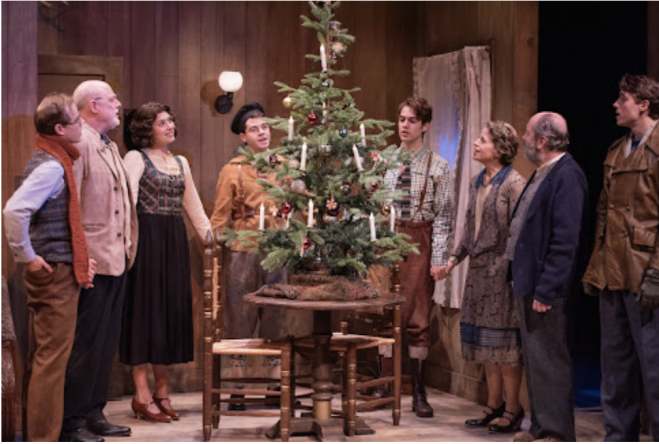
The Ensemble of Crooked Cross (Photo: Todd Cerveris Photography)
Crooked Cross
By Marc Miller
There’s a 1940 movie, The Mortal Storm, wherein an average family in the German Alps is divided and undone by the rise of the Third Reich, with tragic results. Since these earnest young Germans are played by James Stewart, Margaret Sullavan, Robert Young, and Robert Stack, it’s a bit of a challenge to take at face value—all those Midwestern drawls keep getting in the way. But MGM was praised at the time for Hollywood’s first attempt to call attention to the growing Nazi threat.
Hollywood, though, was beaten to the punch by the Brits. A 1935 play, Sally Carson’s Crooked Cross, based on her own 1934 novel, covered much of the same territory; The Mortal Storm could be its younger brother. The Mint Theater Company, with its laudable dedication to rescuing worthy old plays from oblivion, now offers Crooked Cross’s American premiere, in a typically well-wrought production. This time, though, it hasn’t uncovered a gem.
Instead, it’s uncovered a family drama somehow milder than the tense environment it inhabits. We begin in 1932, where the Kluger family of Munich is inviting friends over to witness the newly decorated Christmas tree. Kluger (Liam Craig) is stolid and grumpy; Frau Kluger (Katie Firth) defines “typical housewife.” We’re mainly concerned with their young-adult children. Helmy (Gavin Michaels) is a little goofy and given to quicksilver mood changes. Erich (Jakob Winter) is good-looking and confident. And Lexa (Ella Stevens) is quick-thinking and quick-talking, which would seem to make her an ideal match for family friend Moritz (Samuel Adams), the smart, gifted young doctor she’s dating. It’s a happy gathering, and Carson keeps the small talk terribly small. About the only forward plot motion is the revelation that Moritz has been fired from his hospital, ostensibly for not joining the Nazi Party, but really, we learn a little later, for being named Weissman.
So the gears are in motion, and we proceed down a path that may have been surprising and disturbing in 1935 but now feels familiar. Erich and Helmy join the party and are soon donning stormtrooper uniforms with swastikas, the titular crooked crosses; Moritz and Lexa, in love but confronting rapidly growing social obstacles, including her brothers’ increasing antagonism toward their former friend, meet privately and plot his escape.
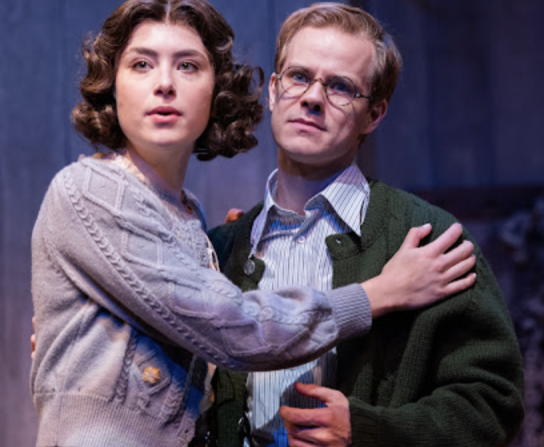
Ella Stevens, Samuel Adams (Photo: Todd Cerveris Photography)
Not to belittle the horrifying progression of a madman’s seizing of a gullible nation; it’s just a story that’s been played out many times. And Carson, about whom little is known, made some minor but telling basic playwriting errors. Entrances and exits happen at too-convenient moments. A sturdy young Nazi (Ben Millspaugh) suddenly faints, because the two other characters he’s with need to have a private conversation and there’s no logical way to get him off the stage. Characters just discovering that loved ones have died go on talking calmly, no outward shock or grief, to push the plot along. Carson also indulged in some self-censorship, for instance eliminating “Heil Hitler” from the script, to please the Lord Chamberlain’s office. Director Jonathan Bank notes that he restored some of the dialogue she cut, and eliminated some supporting characters, to downsize the production needs and ramp up the tension.
But the tension’s never as high as it ought to be. Carson’s dialogue, lifted directly from her novel, is highfalutin, a lot of “rah-ther” and “frock” and “sufferance”, and doesn’t emerge naturally from the actors’ mouths. Promising plot tidbits, like the worsening vision of Moritz’s father (Douglas Rees) or Erich’s playing gigolo to rich older women, are picked up and dropped. And you’d be forgiven for finding some of Carson’s prose on the drippy side. Lexa: “When we meet here or under the fir trees by the river or on the mountain for a few hours we get into touch again, but it’s all so quick, so breathless, longing to see you, counting the moments, then dreading leaving you…” Who talks like that?
The cast is… fine, in a dutiful way. I kept looking for something in Stevens’s personality, a quirk, a spark, to make Lexa a more off-center, dynamic individual, but I didn’t find it. Michaels does give Helmy an edge, a conflict over loving his sister vs. loving the Nazi Party, that makes him compellingly unpredictable. Jack Mastrianni brings a lot of color to Otto, the clumsy Nazi shlub who wants to sweep Lexa off her feet. And Adams’s Moritz—he’s convincing, he does everything right, he just, I don’t know how else to put this, he just doesn’t seem very Jewish.
The Mint does its usual good production work on an unlavish budget. Alexander Woodward’s set revolves between the modestly appointed Kluger living room and Moritz’s shabbier lodging; two other scenes are played before the curtain. Christian DeAngelis’s lighting has one thrilling effect, Christmas Eve fireworks reflected in the Klugers’ faces. And Sean Hagerty’s sound is really excellent, throwing the chatter at a ball and a Nazi anthem to the back of the house.
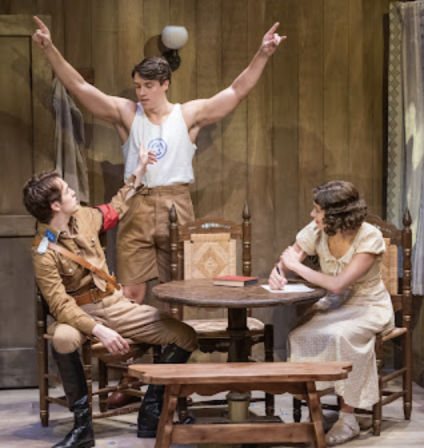
Gavin Michaels, Jakob Winter, Ella Stevens (Photo: Todd Cerveris Photography)
Carson showed remarkable foresight in dramatizing the Reich’s ascent and its splintering of German society before practically anyone else did, and it was brave of her to put it between covers and on the British stage. (She also published two more novels about the Klugers, and married and had three children, before succumbing to breast cancer in 1941.) We can salute her for that, and for writing lines, like “People have a way of disappearing,” that retain an uncomfortable currency on these shores. But her skill as a playwright, let’s admit it, wasn’t fully developed. The Mint will no doubt go on discovering fine old forgotten plays. They can’t all be winners.
Crooked Cross
Theatre Row Stage 4
410 W. 42nd St.
Through Nov. 1, 2025
Tickets: Crooked Cross – Building for the Arts

